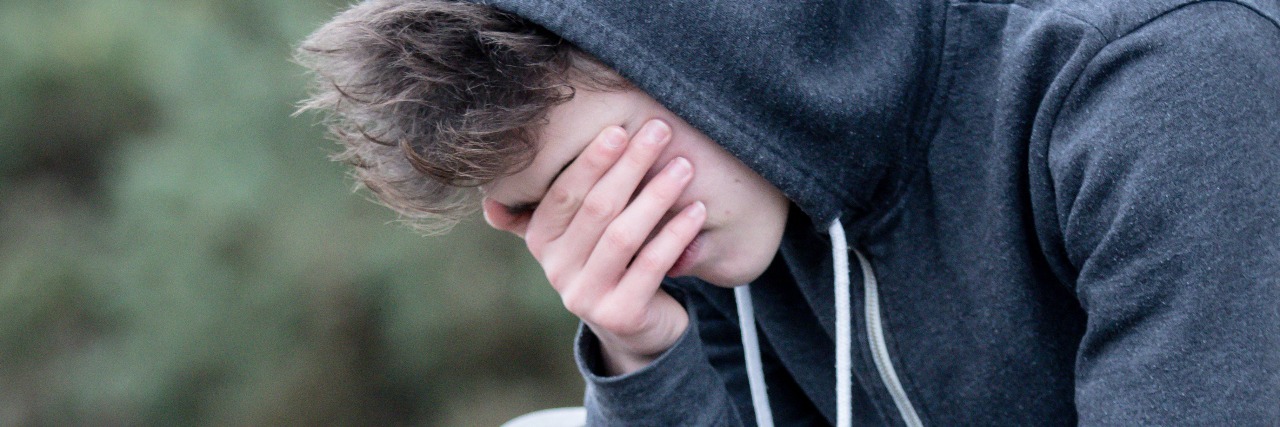Why People Shouldn't Joke About Mental Illness
If you struggle with self-harm or experience suicidal thoughts, the following post could be potentially triggering. You can contact the Crisis Text Line by texting “START” to 741-741. For a list of ways to cope with self-harm urges, click here.
Mental illness is invisible. It has no fever or wounds to alert people to the pain inside. It can affect anyone; no one is immune. People often forget this. They throw words and jokes around, not thinking about the fact that war might be raging in the head of someone who hears those words. The fact is that words hurt, even if the intention wasn’t to hurt.
I want to say something. I want to say it to the person in my art class last year who mimed a method of self-harm, not knowing that across the table I was tugging at my sleeves to make sure all my scars were covered, while shame and guilt filled my stomach.
I want to say it to the boy who, after a survey in class, laughed and said loudly, “The back page of the survey asked if I have self-harmed, had a suicidal thought or attempted suicide in the past six months. Ha! Like anyone sane would do that. Only freaks self-harm.” He didn’t know that three seats away I had answered yes to all three questions.
I want to say it to the boy in my neighborhood who asked, “Why are you wearing all black? What are you, depressed?” He laughed like it was an insult.
I want to say it to the girl in my math class last year who said, “If we have another test today I am going to literally kill myself.”
I want to say it to the people who use bipolar as an adjective, ignoring the fact that bipolar disorder is a serious illness that affects millions of people. I want to say it to the people who use the acronym OCD like it’s a cute personality quirk, rather than a severe anxiety disorder that can affect a person’s entire life. I want to say it to everyone. I want to say it to you.
More people deal with mental illnesses than you might realize. One in four people will deal with mental illness in their lifetime. Think about your friends. It’s more than likely that one or more of them are currently dealing with one. Think about that the next time you go to make a joke or use scathing or insulting words or phrases when referring to mental illness, or the people who struggle with them. You never know, the person who you are talking to could be fighting for their life inside their mind.
Overheard words can hurt just as bad as words said to your face. Every time I overhear someone laugh about, mock, belittle or insult mental illness or someone who deals with one, it feels like I’ve been punched in the stomach. Guilt, shame and fear suffocate me. The comments are like bombs going off. The words rip through me like shrapnel. They can also have a more permanent effect; there have been many times I’ve heard other people’s comments and they have nearly tipped me over the edge. It probably has for many people and we’ll never know. We should use words to call someone away from the edge, not push them over.
Unsaid words hurt as well. Mental illnesses are often ignored or not talked about. They are avoided and hidden, leading people to struggle in silence. They are quieted by shame and fear. They hide their pain, afraid to speak up and ask for help. If someone is afraid to ask for help, how can they receive it? They can’t. Without anyone to turn to, they are left feeling alone, helpless and hopeless. How many people have died because of the silence and shame that surrounds mental illnesses? We may never know, but without people deciding to speak up and actually talk about mental illnesses, nothing will happen. Nothing will change and unsaid words will continue to hurt.
Mental illnesses are not a joke. They are not an adjective. They are not an insult. They are not something to be ashamed of. They are not something to belittle. People who struggle with mental illnesses are not “crazy.” They are not freaks. They are not weak. They are not “insane.”
Mental illnesses are incredibly serious, not jokes. They are a diagnosis, not descriptors. They are facts, not insults. They are something to accept, not be ashamed of. They are important, not something to belittle. People who deal with mental illnesses are warriors, not “crazy.” They are fighters, not freaks. They are strong, not weak and they are just as “sane” as everyone else.
We, as a society, need to start talking about mental illness in everyday settings and we need to talk about them respectfully. We shouldn’t treat them as adjectives, descriptors, insults or something to be ashamed of. We shouldn’t label the people who deal with them as crazy, weak or a freak. We need to start paying attention to the words we say and the words we leave unsaid. People lives depend on it.
If you or someone you know needs help, visit our suicide prevention resources page.
If you struggle with self-harm and you need support right now, call the crisis hotline at 1-800-273-8255 or text “START” to 741-741. For a list of ways to cope with self-harm urges, click here.
We want to hear your story. Become a Mighty contributor here.
Thinkstock photo via Ben_Gingell.

